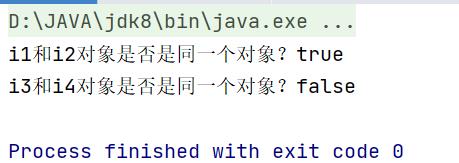设计模式 结构型模式 -- 享元模式 JDK源码分析 Integer
Posted Z && Y
tags:
篇首语:本文由小常识网(cha138.com)小编为大家整理,主要介绍了设计模式 结构型模式 -- 享元模式 JDK源码分析 Integer相关的知识,希望对你有一定的参考价值。
1. JDK源码分析
Integer类使用了享元模式。我们先看下面的例子:
package com.tian.flyweight.jdk;
public class Demo {
public static void main(String[] args) {
Integer i1 = 127;
Integer i2 = 127;
System.out.println("i1和i2对象是否是同一个对象?" + (i1 == i2));
Integer i3 = 128;
Integer i4 = 128;
System.out.println("i3和i4对象是否是同一个对象?" + (i3 == i4));
}
}
运行结果:

为什么第一个输出语句输出的是true,第二个输出语句输出的是false?通过反编译软件进行反编译,代码如下:
public class Demo {
public static void main(String[] args) {
Integer i1 = Integer.valueOf((int) 127);
Integer i2 Integer.valueOf((int) 127);
System.out.println((String) new StringBuilder().append((String) "i1\\u548ci2\\u5bf9\\u8c61\\u662f\\u5426\\u662f\\u5 40c\\u4e00\\u4e2a\\u5bf9\\u8c61\\uff1f").append((boolean) (i1 == i2)).toString());
Integer i3 = Integer.valueOf((int) 128);
Integer i4 = Integer.valueOf((int) 128);
System.out.println((String) new StringBuilder().append((String) "i3\\u548ci4\\u5bf9\\u8c61\\u662f\\u5426\\u662f\\u5 40c\\u4e00\\u4e2a\\u5bf9\\u8c61\\uff1f").append((boolean) (i3 == i4)).toString());
}
}
上面代码可以看到,直接给Integer类型的变量赋值基本数据类型数据的操作底层使用的是valueOf() ,所以只需要看该方法即可:
public final class Integer extends Number implements Comparable<Integer> {
public static Integer valueOf(int i) {
if (i >= IntegerCache.low && i <= IntegerCache.high)
// -128 ~ 127 之间的数字在缓存当中取得
return IntegerCache.cache[i + (-IntegerCache.low)];
// 其余的数字创建一个新的对象
return new Integer(i);
}
private static class IntegerCache {
static final int low = -128;
static final int high;
static final Integer cache[];
static {
// 在这里给high赋值
int h = 127;
String integerCacheHighPropValue = sun.misc.VM.getSavedProperty("java.lang.Integer.IntegerCache.high");
if (integerCacheHighPropValue != null) {
try {
int i = parseInt(integerCacheHighPropValue);
i = Math.max(i, 127);
// Maximum array size is Integer.MAX_VALUE
h = Math.min(i, Integer.MAX_VALUE - (-low) - 1);
} catch (NumberFormatException nfe) {
}
}
high = h;
cache = new Integer[(high - low) + 1];
int j = low;
for (int k = 0; k < cache.length; k++) cache[k] = new Integer(j++);
// range [-128, 127] must be interned (JLS7 5.1.7)
assert IntegerCache.high >= 127;
}
private IntegerCache() {
}
}
}
可以看到 Integer 默认先创建并缓存-128 ~ 127 之间数的 Integer 对象,当调用 valueOf时如果参数在-128 ~ 127 之间则计算下标并从缓存中返回,否则创建一个新的 Integer 对象。
以上是关于设计模式 结构型模式 -- 享元模式 JDK源码分析 Integer的主要内容,如果未能解决你的问题,请参考以下文章